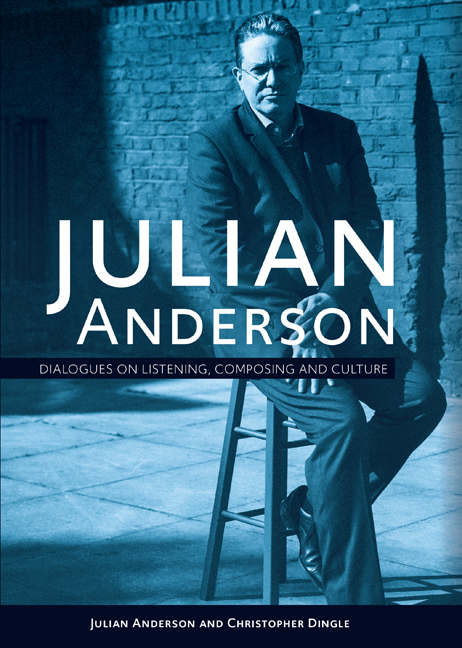Book contents
- Frontmatter
- Contents
- List of Illustrations
- Foreword
- Acknowledgements
- Introduction
- Prelude – Jeux: A Conversation Over Lunch
- Conversation One Origins
- Conversation Two Enthusiasms
- Conversation Three Training
- Conversation Four Dance
- Conversation Five Folk
- Conversation Six Composing (or Not)
- Conversation Seven Understandings
- Conversation Eight Beginnings (and Endings)
- Conversation Nine Puzzles
- Conversation Ten Singing
- Conversation Eleven Olly
- Conversation Twelve Memory
- Conversation Thirteen Opera
- Conversation Fourteen Practices
- Conversation Fifteen Outsiders?
- Conversation Sixteen Quartets
- Conversation Seventeen Advocacy
- Conversation Eighteen Partnerships
- Coda: Multiple Choices
- Chronology
- List of Personae
- Glossary of Musical Terms
- Macrotonality
- Catalogue of Published Works by Julian Anderson
- List of Recordings of Julian Anderson’s Music
- Bibliography
- Discography
- Index
Foreword
Published online by Cambridge University Press: 16 September 2020
- Frontmatter
- Contents
- List of Illustrations
- Foreword
- Acknowledgements
- Introduction
- Prelude – Jeux: A Conversation Over Lunch
- Conversation One Origins
- Conversation Two Enthusiasms
- Conversation Three Training
- Conversation Four Dance
- Conversation Five Folk
- Conversation Six Composing (or Not)
- Conversation Seven Understandings
- Conversation Eight Beginnings (and Endings)
- Conversation Nine Puzzles
- Conversation Ten Singing
- Conversation Eleven Olly
- Conversation Twelve Memory
- Conversation Thirteen Opera
- Conversation Fourteen Practices
- Conversation Fifteen Outsiders?
- Conversation Sixteen Quartets
- Conversation Seventeen Advocacy
- Conversation Eighteen Partnerships
- Coda: Multiple Choices
- Chronology
- List of Personae
- Glossary of Musical Terms
- Macrotonality
- Catalogue of Published Works by Julian Anderson
- List of Recordings of Julian Anderson’s Music
- Bibliography
- Discography
- Index
Summary
In April 2002 I invited Julian Anderson to give a talk on Hungarian composer György Kurtág at London's Southbank Centre. His audience was an enthusiastic but non-specialist group of concert-goers, packed into an upper room in the Royal Festival Hall. ‘How long do you want?’ Julian asked as he was about to start, and I told him he had forty minutes to give an overview of Kurtág's life and music. He took his seat and, without notes and without a watch or a timepiece of any kind spoke, in a perfect arc – for exactly forty minutes. The talk appeared to be spontaneous, as if he was just summoning things that he’d remembered on the spot. But there was a structure: a beginning, a middle and an end and, along the way, Anderson unpacked the essential details of Kurtág's intricate music and laid them before the Southbank audience with unflinching clarity. It struck me at the time that this talk was a particularly virtuosic example of a masterly composer's highly developed sense of how to structure time. I was also struck by his unrivalled ability to communicate with such clarity his prodigious knowledge of this particular music and its place in world history and culture. I knew that he could have done the same on any one of a huge variety of subjects across a vast range of music. It would be obvious, and a cliché, to say that Julian's knowledge of music is dazzling; but it never dazzles. It is generous, it makes us all understand better – it illuminates.
I’ve been lucky enough to benefit from many conversations about music with Julian over lunches, on the telephone, after concerts, and each one has left me feeling enriched, emboldened and looking at things in a different way than before. The gathering together into a book of such knowledge, such clarity of thought, such intellectual generosity is welcome and overdue. It's clear that Julian Anderson could be a major writer on music and culture, like Schumann or Schoenberg or Cage or Rameau.
- Type
- Chapter
- Information
- Julian AndersonDialogues on Listening, Composing and Culture, pp. ix - xPublisher: Boydell & BrewerPrint publication year: 2020

